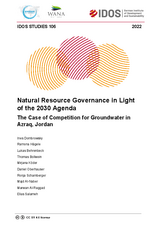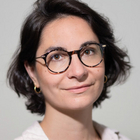Natural resource governance in light of the 2030 Agenda: the case of competition for groundwater in Azraq, Jordan
Dombrowsky, Ines / Ramona Hägele / Lukas Behrenbeck / Thomas Bollwein / Mirjana Köder / Daniel Oberhauser / Ronja Schamberger / Majd Al-Naber / Marwan Al-Raggad / Elias SalamehStudies (106)
Bonn: German Institute of Development and Sustainability (IDOS)
ISBN: 978-3-96021-186-0
DOI: https://doi.org/10.23661/is106.2022
This study analyses a complex social-ecological system (SES), the case of competition for groundwater in Azraq, in the light of the 2030 Agenda. Building on the Institutional Analysis and Development Framework (IAD) and the concept of Networks of Adjacent Action Situations (NAAS) it assess the complex governance system in a consistent and systematic manner. It includes aspects of power through the political economy concept of the social contract. It furthermore assesses the performance of the investigated SES against the 2030 Agenda’s core principles ‘leaving no one behind’, ‘interconnectedness and indivisibility’, ‘multi-stakeholder partnerships’, and ‘inclusiveness’.
The study finds that in Azraq, agricultural, domestic and environmental water users compete for shrinking groundwater resources. The core of the conflict lies between a heterogeneous group of farmers, who use groundwater for irrigation agriculture supported by a strong political lobby, and the water authorities, which rely on the aquifer for domestic water supply at national level. Water, agricultural, environmental, energy, and land governance, but also high-level decision-making and the monarchy’s underlying social contract and the informal concept of wasta influence the outcomes on the ground. As a result, groundwater governance in Jordan hardly does justice to the 2030 Agenda’s core principles. The study shows that no panacea exists, but that systems thinking may help identify a range of intervention points, some more sensitive than others, that could support a social-ecological transformation towards sustainability.



